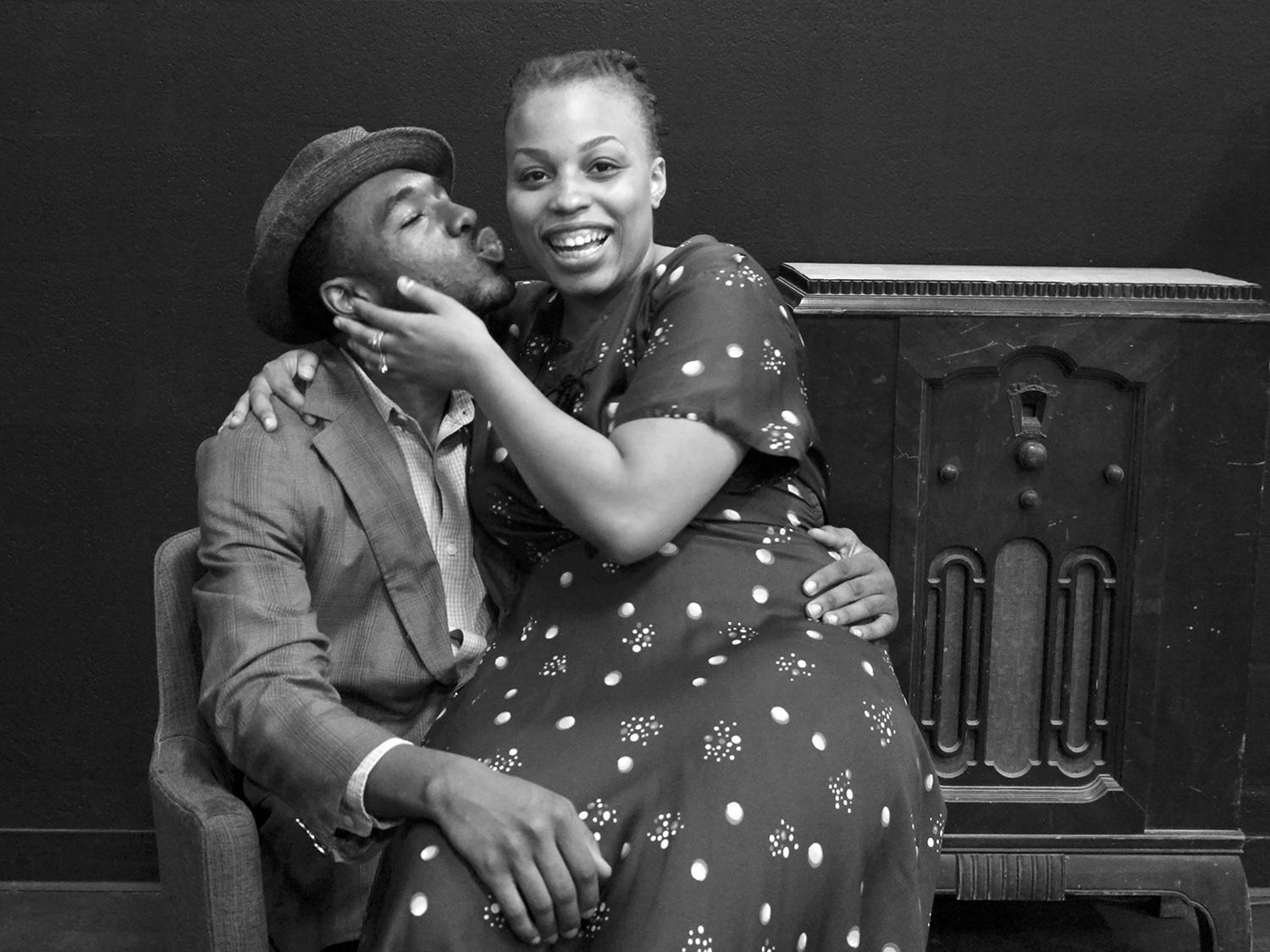'Clybourne Park' -- Albert (left) and Francine, played by SUNY Oswego students Trey Thomas and Ahmanee Simmons, enjoy a happy moment in the "Clybourne Park," coming this month from the college's theatre department on the Waterman Theatre stage. The play satirizes attitudes about race relations and gentrification. (SUNY Oswego/Maria-Ray Ossino photo)
The SUNY Oswego theatre department's October production of "Clybourne Park," a Pulitzer Prize- and Tony-winning play satirizing ingrained notions about race relations and gentrification, should cause audience members to recognize their shared humanity, the play's director says.
"Clybourne Park," writer Bruce Norris' 2009 spinoff of the groundbreaking 1959 play "A Raisin in the Sun," will run at Thursday through Saturday, Oct. 19 to 21 and 26 to 28. The Saturday shows, Oct. 21 and 28, are matinees at 2 p.m.; all others are at 7:30 p.m. [DATES CORRECTED on 10-4-17] All performances will take place on the Waterman Theatre stage in Tyler Hall. Theatre faculty member Henry Shikongo will direct.
The play unfolds in two acts: In 1959, a white couple has inadvertently sold their house to the neighborhood's first black family, after having decided to move to the suburbs following a family tragedy. Neighbors vehemently urge the couple to back out of the deal.
Fifty years later, a white couple buys the property in what is now a predominantly black neighborhood, raising fears of white gentrification. Another community showdown pitting race against real estate takes place. The home -- the same one made famous in Lorraine Hansberry's "A Raisin in the Sun" -- is the battleground once again.
If the play is to be successful, it should follow Norris' example and not point fingers, but allow the audience to find a universal truth, Shikongo said.
"The script does not tell us who is right or wrong, who is racist or not in the play," Shikongo said. "It makes us laugh at ourselves. When you are relaxed and laughing, you can lower your defenses and say, 'We do that! Isn't that silly.'"
In so doing, the "human comedy" opens hearts to real reflection and real learning, he said. "We don't make theatre for critics or elite audiences, though we're happy to include them. I think theatre is for the everyday person to have an opportunity to be reminded of their humanity."
Play's evolution
The show will continue to evolve in rehearsal, Shikongo said. "I think as a director, you show up with a great deal of homework finished. You become really interested in the story, the people and you make friends with them in your imagination."
Yet, the director said, he's unafraid to throw his homework out, allowing the actors and crew to help shape the production to what it's going to become on stage.
"My approach is not to impose things on the other artists. They are creating, too," he said. "Eventually, we will find a flow of one mind. That's the very soul of the creative process. … It's so much more satisfying when we can all find it together."
Seven actors each play different roles in the two acts. For example, in Act I, Olivia Wilmot plays a deaf character, Betsy, wife of Karl (Carl Neff), who has sold the house. In Act II, both become a young couple, Lindsey and Steve, seeking to buy the house from a black family 50 years later.
Betsy does speak, with difficulty, as her husband tries to persuade Russ (Sean Ryan) and his wife Bev (Megan Twamley) not to sell to a "colored family." Shikongo said Wilmot has done a great deal of research in an effort to make Betsy multi-dimensional, which the director believes was Norris' intent.
"We have made it a collective choice to empower this character, to allow her character to have dignity," Shikongo said. A member of the deaf community locally will visit rehearsals to educate not only "Betsy," but all of the cast and crew, he said. The matinee on Oct. 29 will feature signers, encouraging the hearing impaired to attend. As a further aid at any performance in Waterman Theatre, those with hearing aids can connect with the room's hearing loop.
Other cast members include Ahmanee Simmons as Francine/Lena, an African American maid in Act I and community advocate fiercely opposed to white gentrification in Act II. Trey Thomas will play her husbands, Albert in Act I and Kevin in Act II. Alex Forrest is Tom/Jim/Kenneth. Ryan and Twamley play Dan and Kathy, respectively, in Act II.
Tickets for "Clybourne Park" are available for $15 at any SUNY Oswego box office, online at tickets.oswego.edu or by calling 315-312-2141. Parking is included in the price of a ticket, and is available in the employee lot in front of Culkin Hall and the employee and commuter lots behind Hart and Funnelle residence halls.
People with disabilities who need assistance to attend should call 315-312-2141 in advance of a performance.
For more information on the performing and fine arts at SUNY Oswego, visit oswego.edu/arts.




